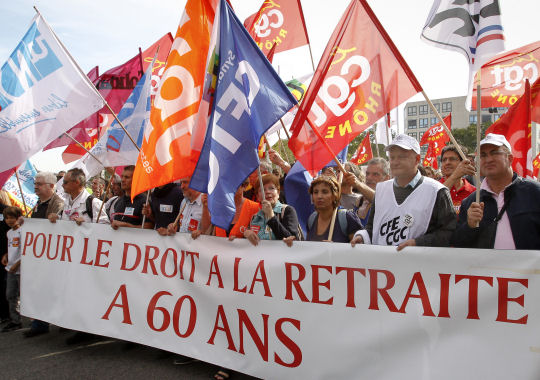French protest retirement age in their millions
Unions say over two million people have turned out to protest against President Sarkozy’s pension reform bill, which will increase the minimum retirement age to 62.
The national strike was to protest against the planned changes in pension laws.
Airlines cancelled up to half of flights and half of intercity rail services. Up to half of flights were cancelled at Paris Charles de Gaulle airport and 40 to 50 percent of flights were scrapped in other regions, according to airport authorities.
Organisers aimed to draw more than two million people onto the streets of Paris to campaign against Nicholas Sarkozy’s plans to raise the retirement age.
The demonstration came two weeks after widespread protests across the country two weeks ago which drew between one and three million people.
The protest hit public services, with schools and transport most severely affected. Just half of national train services and flights operated.
“The number of demonstrators will be decisive for the future of the movement” said Francois Chereque of the large French Democratic Confederation of Labour (CFDT) union.
'Out - they're worthless'
They're putting out the bunting and the posters of President Sarkozy and his labour minister, Eric Woerth with the words: Dehors – ils ne valent rien! writes Lindsey Hilsum.
Out – they're worthless! International Editor Lindsey Hilsum writes; and we can expect maybe a million on the streets of French cities today protesting the government’s plan to increase the pension age from 60 to 62.
The French Finance Minister Christine Lagarde told me this morning that the government "won't lose its nerve."
Read more
The policy
Unions want to keep the right to retire at 60, and oppose the proposed move to raise the age to 62.
The bill has already been passed by France’s lower house of parliament, and will be debated in the upper house from 5 October.
Despite fierce opposition Sarkozy has vowed to press on with the plans and the law is expected to pass in the Senate.
Labour Minister Eric Woerth said the protests would not alter the course of the legislation: “We haven’t changed. We are very firm on the core of the reform, which is (the retirement) age. If you don’t reform it, it simply won’t be viable and we won’t be able to pay French peoples’ pensions.”
Sarkozy vowed to reduce the deficit by 2013 and preserve France’s AAA rating which allows it to borrow at the lowest rates.
The government said this reform could save the government 70bn Euros (£59bn) by 2030, and is essential to erase a growing deficit.
France’s public deficit currently stands at eight per cent of its GDP, which is above the euro zone target of three per cent.
Pension reform
- Under current rules French men and women can retire at 60, but they only get a full pension if they have paid social security contributions for a set period, for most working at the moment that is 40.5 years.
- Under the new law the number of years needed for a full pension would rise to 41.5, and the minimum retirement age would also rise to 62.
- The age at which retirees can get a full state pension even if they have not paid the required number of years contributions currently stands at 65. Under the new law that would rise to 67 by 2018.

Policy “unfair”
But unions argued that the policy is unfair and will raise civil servants’ contributions to private sector levels.
They said making people work longer was unjust and would most affect those who start work young or do physically demanding jobs and women who took career breaks.
Opponents have proposed taxes on certain bonuses and the highest incomes to bolster the pension fund instead.
Socialist party leader Martine Aubry urged protesters not to give up: “We will throw all our force into the battle because pension reform is a battle for justice and for the republic.”
A poll by Viavoice showed 59 per cent were opposed to the age rise, and 63 per cent supported the protests.
Mr Sarkozy has made pension reform a key part of his policy, and analysts said to back down would leave the Presidency in tatters.
He is widely predicted to make a bid for re-election in 2012 and is seen to be courting the far right vote with hard line policies such as the recent expulsion of Roma migrants and demolition of campsites.
Ministers have implied they could be willing to make concessions to the pension reform policy, such as qualifying arduous work for earlier retirement, and taking into account the situation of those with fragmented pension rights.
But they are standing hard and fast on the retirement age.




